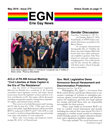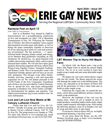Finding common ground in LGBT Health centers
from Mark Segal of Philadelphia Gay News: Last week, the LGBT medical clinic in Philadelphia, Mazzoni Center, which serves more than 35,000 clients, announced that the board had appointed a new CEO. Lydia Gonzalez Scirarrino, it turns out, is not LGBT, and that seemed to distress some people in the City of Brotherly Love and Sisterly Affection. How could a non-LGBT person head an organization that has a majority of its clients from the LGBT community?
There seems to be a way to find common ground on this issue, and it's possible that the answer is already out there. Take Washington, D.C., as an example. The LGBT community clinic there, Whitman-Walker Health, has been run by an LGBT ally for years. In other words, a straight white male. And guess what? There are many other non-LGBT people across the country running organizations that serve mainly LGBT people, especially among health and HIV/AIDS organizations, but not as many in activist, equality or LGBT political organizations.
There are many ways to look at this: Are these professional heads of nonprofits taking the job just for a good payday? Are they people who have had a calling on our issues? Does their life history add something to our struggle towards equality and diversity? Does it bring us closer to the fight for social justice in all areas of this divided nation? And the real question in a truly fair world should be: Are they the most qualified person for the position?
Here's one way to look at it from another community's perspective: Are there any non-African-Americans running African-American organizations? Recall Rachel Dolezal, who lived as a black woman and headed her local NAACP. It caused a national controversy when it was discovered she was white - a discussion that still goes on in that community today. She finally resigned. Would that be considered discrimination? The same goes for Latino, Jewish and Catholic community organizations. Haven't done the research on that, but somehow I have a feeling that what happened to Ms. Dolezal is the norm. There is another factor, however, which is that she concealed her background while running a rights organization that mostly was volunteer-driven, not a health center with thousands of clients with medical needs and was honest about her background and qualifications.
And one last thought: It also might be as simple as geography. In a place where the LGBT community is still struggling and has few such organizations, there might in fact be a need for an LGBT executive director, since those areas need good LGBT spokespeople and role models.
The answer is out there, but only if we have a civil discussion. Maybe our community can lead the way on an issue that many communities are also facing. It's not just the LGBT community. Native American health Clinic's are headed by non- native American's. And even the indigenous community's in Alaska have non-indigenous director's. We who are still fighting for non-discrimination, should we be discriminating? Seems the issue is qualification, professionalism and a willingness to learn and have a passion for involvement with the community you serve.
Mark Segal, PGN publisher, is the nation's most-award-winning commentator in LGBT media. His recently published memoir, "And Then I Danced," is available on Amazon.com, Barnes & Noble or at your favorite bookseller.




